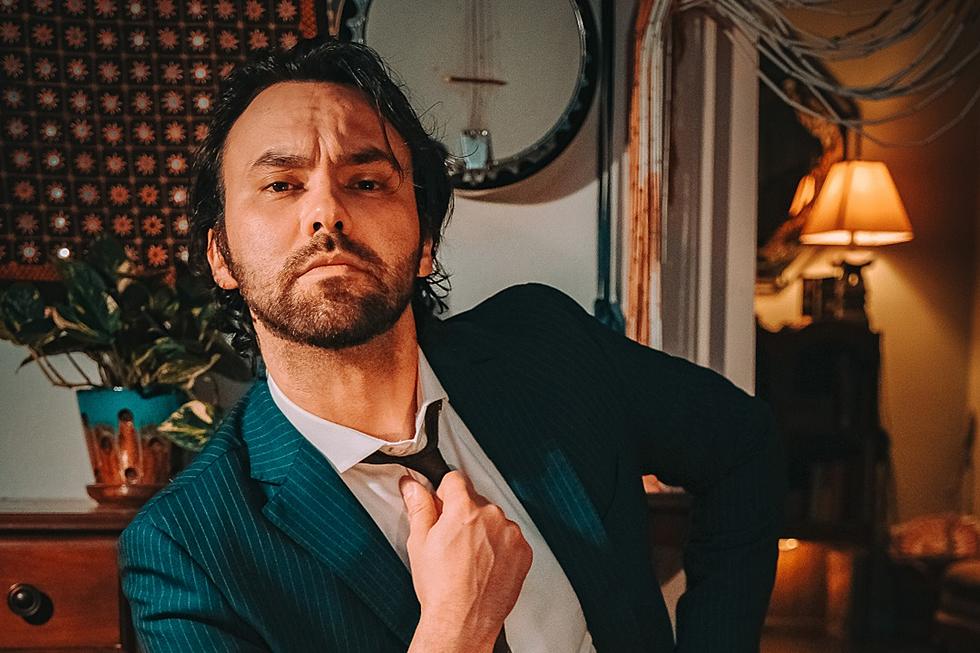
Shakey Graves Interview: How a ‘Haunted’ Guitar Helped Him Find His Sound
Alejandro Rose-Garcia -- the Austin, Texas-born singer-songwriter better known as Shakey Graves -- is in possession of a haunted guitar. And that might not even the wildest part of the story.
The 1932 Gibson L-7 originally belonged to a man named Jay Manley, a World War II veteran and Kansas City-based jazz musician, and the boyfriend of the grandmother of Rose-Garcia's friend, who goes by Jason 71.
"If there ever was a vampire, he could be a cool vampire," Rose-Garcia says of Jason 71. "He always wore the same outfit -- which was all-black denim and a nametag that said, 'Hello, my name is Jason 71' ... and he's, like, this pale, redheaded guy with really pretty eyes."
Rose-Garcia and Jason met through a mutual friend, Tommy, who ran 2023, "a picturesque loft -- a well-run speakeasy with a bunch of hip people" in Los Angeles, Calif. The musician was early in his career -- he'd yet to release his debut album, 2011's Roll the Bones -- and opening shows at the club; taking possession of Manley's guitar would mark a turning point.
It was Tommy's birthday, and he and Rose-Garcia had consumed "some special chocolates" a patron had left in the tip jar before Tommy introduced Rose-Garcia and Jason. The two new acquaintances headed to the roof to smoke a cigarette, "and we just immediately just started going back and forth and talking about life and the universe and music," Rose-Garcia recalls to The Boot. They clicked, and quickly.
Later that night, after Rose-Garcia's set, Jason approached him with an offer: "He's like, 'You know what, this is perfect. I've been waiting for this. I have something for you ... I have a 1932 Gibson L-7 guitar at my apartment ... and I think you should play the guitar.'"
"[I was like], 'What are you talking about?' Like, we've hung out for four hours," Rose-Garcia recounts, joking that when he left with Jason to go get the guitar, he thought, "Okay, I'm gonna get murdered by this vampire." But, "sure enough, he pulls this little guitar case out and pulls this ancient, beautiful guitar that's all used -- you know, it's obviously not just been a case creature; it's a very used guitar," Rose-Garcia remembers.
Jason, too, was a musician, but he played bass. He'd been "looking for someone who would prosper from playing this specific guitar ... who could actually unlock whatever this guitar has, you know, because it's got good juju," says Rose-Garcia.
So, Rose-Garcia took the guitar home. He tried tuning it a couple times, but the instrument simply would not cooperate: "It was a very stubborn guitar," he says.
"Eventually, I sat down and I was like, we're gonna mind meld with this guitar. And I just kind of let it go into whatever tuning it wanted to be ... and started playing it," Rose-Garcia continues. "And pretty much immediately, I started playing differently, because it was in some strange tuning -- I didn't know what it was -- so my hands just kind of started jumping around on the fretboard."
He was off to the races. Rose-Garcia quickly wrote "Roll the Bones," the title track of his debut album, as well as Roll the Bones' second song, "Built to Roam," and "Late July," a live favorite, the original version of which appears on Roll the Bones X, a 10th anniversary, expanded edition of that first album, released on Friday (April 2).
"[I wrote] six different songs, essentially, that all have been sort of become synonymous with my guitar-playing style, and are the songs that have taken me the farthest in my career, and are the ones that I would carry into a room and be like, 'This is my weird song that I play,'" Rose-Garcia says. "Those are all written off of this guitar."
Roll the Bones X, then, in a tells the story of Manley's haunted guitar, and of Rose-Garcia's connection to it. The record's original first disc is now accompanied by a second disc of 15 additional tracks: early versions of songs, deep cuts and a series of interludes that trace the instrument's history.
When Rose-Garcia originally released Roll the Bones, he did so only via the digital platform Bandcamp, and with no fanfare at that. After years work as an actor (you may have seen him in the TV series Friday Night Lights), he says, "the last thing I wanted was to have it be about me, you know? I wanted it to really be about the music."
The album may have stayed an underground secret of sorts if not for a stroke of luck: An employee of the site found Roll the Bones and spotlighted it as an editor's pick. It still remains among the site's top-selling records.
"I still have a lot of faith in the fact that if somebody that's a friend of yours shows you [a piece of music] ... even if it sounded like s--t, you'd be like, 'This is the coolest,'" Rose-Garcia explains. It's an ethos he's leaning on as he explores what comes next, even as the way the music industry works and the format in which music is distributed shifts and changes almost constantly.
"If I can make something feel like that magical record that you have from your friend, you'll never throw it away. You're gonna be buried with that thing, you know what I mean?" he says. "People are just finding ways to band together and be like, 'I'm just putting music out.' There's no big campaign ... 'I'm putting this out, you're liking it, and then you're coming to hang out with me.'
"And I'm like, 'That is just what's up!'" he adds. "That's so cool. That's revolutionary."
More Country Albums Coming in 2021:
More From TheBoot









